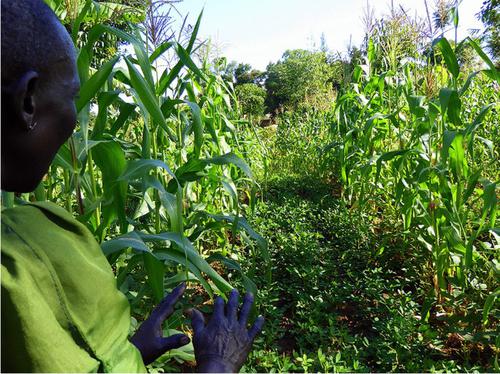Agronomy for Sustainable Development ( IF 6.4 ) Pub Date : 2023-05-16 , DOI: 10.1007/s13593-023-00893-w Wytze Marinus , Gerrie WJ van de Ven , Katrien Descheemaeker , Bernard Vanlauwe , Ken E Giller

|
Sustainable intensification aims to increase production and improve livelihoods of smallholder farmers in sub-Saharan Africa. Many farmers, however, are caught in a vicious cycle of low productivity and lack of incentives to invest in agricultural inputs. Moving towards sustainable intensification therefore requires support such as input subsidies and learning about new options through, for instance, co-learning approaches. Yet such support is not straightforward as agricultural developments often diverge from the envisaged pathways: extensification may occur instead of intensification and specialization instead of diversification. Understanding of farmers’ responses to incentives such as input subsidies and new knowledge is lacking. Our overarching aim was to improve this understanding, in order to better support future pathways for agricultural development in smallholder farming. Over five seasons, we compared the responses of farmers in western Kenya taking part in a novel co-learning program we developed, which included provision of an input voucher, with the responses of farmers who only received a voucher. We also assessed the differences before and during the program. We used diverse indicators that were related to the different agricultural development pathways. Farmer responses were mainly a result of the input voucher. Farmers increased maize yields (intensification) and maize area (specialization) for maize self-sufficiency. Increased farm and maize areas in combination with relatively low N application rates also pointed to extensification coupled with the risk of soil N mining. Diversification by increasing the soybean and groundnut area share was facilitated by the integrated co-learning approach, which thereby supported relatively complex farm management changes. Our results highlight the difficulty of enabling yield and production increases, while also meeting environmental and economic goals. The diversity of farmer responses and constraints beyond the farm level underlined the importance of wider socio-economic developments in addition to support of sustainable intensification at farm level.
中文翻译:

农民对投入补贴和共同学习计划的反应:集约化、扩大化、专业化和多样化?
可持续集约化旨在增加产量并改善撒哈拉以南非洲小农的生计。然而,许多农民陷入了生产力低下和缺乏投资农业投入的动力的恶性循环。因此,向可持续集约化迈进需要投入补贴等支持,以及通过共同学习等方式学习新的选择。然而,这种支持并不简单,因为农业发展往往偏离设想的路径:可能会出现扩展而不是集约化,可能会出现专业化而不是多样化。缺乏对农民对投入补贴和新知识等激励措施的反应的了解。我们的首要目标是提高这种理解,以便更好地支持小农农业未来的农业发展途径。在五个季节中,我们比较了肯尼亚西部农民参与我们开发的一项新颖的共同学习计划(包括提供投入凭证)和只收到凭证的农民的反应。我们还评估了计划之前和期间的差异。我们使用了与不同农业发展路径相关的多种指标。农民的反应主要是投入凭证的结果。农民增加玉米产量(集约化)和玉米面积(专业化)以实现玉米自给自足。农场和玉米面积的增加以及相对较低的施氮量也表明了扩大化以及土壤采氮的风险。综合共同学习方法促进了通过增加大豆和花生面积份额实现的多样化,从而支持相对复杂的农场管理变革。我们的结果突出了在实现产量和产量增加的同时还要满足环境和经济目标的难度。除了支持农场层面的可持续集约化之外,农民在农场层面之外的反应和限制的多样性突出了更广泛的社会经济发展的重要性。










































 京公网安备 11010802027423号
京公网安备 11010802027423号